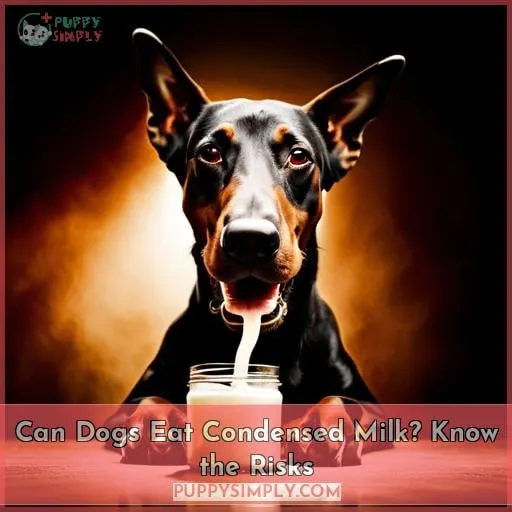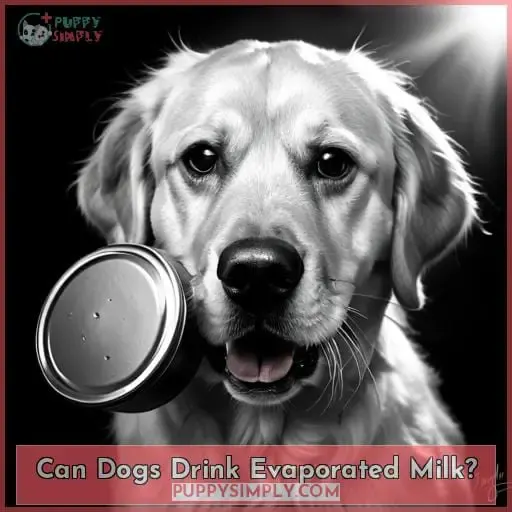This site is supported by our readers. We may earn a commission, at no cost to you, if you purchase through links.

Condensed milk contains high amounts of sugar and fat. These can lead to obesity, diabetes, and pancreatitis in dogs.
Additionally, many dogs are lactose intolerant. They struggle to digest the lactose in condensed milk properly.
While a small amount likely will not harm your pup, it is best to avoid giving them condensed milk altogether.
If you are looking for safe milk options for your furry friend, you will find some better alternatives as we explore this topic further.
Table Of Contents
- Key Takeaways
- Can Dogs Have Condensed Milk?
- What Happens When Dogs Have Condensed Milk?
- Lactose Intolerance in Dogs
- Milk for Newborn Puppies
- Can Dogs Drink Evaporated Milk?
- Is Lactose Free Milk Better?
- Can Dogs Eat Powdered Milk?
- Can Dogs Eat Cream?
- Can Dogs Eat Butter?
- Frequently Asked Questions (FAQs)
- Conclusion
Key Takeaways
- Condensed milk can be given to dogs as a treat, but it should be limited due to its high sugar content.
- Feeding puppies with evaporated or goat’s milk is easier to digest than condensed milk.
- Lactose-free products like almond and oat milks should be given sparingly due to their sugar content.
- Dogs can be lactose intolerant, resulting in vomiting or diarrhea after consuming dairy products.
Can Dogs Have Condensed Milk?
You may have heard that milk is not recommended for dogs, but what about condensed milk? Sweetened, condensed milk can be tolerable for dogs in small amounts. Feeding puppies with evaporated or goat’s milk is a better option as it’s easier to digest.
If you’re considering feeding your dog lactose-free products like almond and oat milks, these should also only be given in limited quantities because they still contain some sugar content which could cause diarrhea if consumed too much.
Raw goat’s milk has smaller fat molecules than cow’s, so it causes fewer digestive issues. However, caution should always be taken when introducing new foods into a pup’s diet to avoid the risk of food allergies or intolerances like lactose intolerance developing over time.
Above all else, though, moderation must be key when giving any type of dairy product to your pet – even those marketed specifically towards canine consumption.
What Happens When Dogs Have Condensed Milk?
When consuming condensed milk, it’s important to remember that moderation should be key in order for your pet to avoid the risk of digestive issues or food allergies. Sweetened, condensed milk can be tolerable for dogs in small amounts but may cause diarrhea due to its high sugar content.
Cream and butter should also not be given regularly as they are high in fat and could lead to pancreatitis risks if consumed too often.
Other alternatives such as sunbutter (made from sunflower seeds) or lactose-free milks like almond and oat milks can also offer a safer alternative with fewer potential risks than regular dairy products.
However, these contain some sugar content so must still only be given occasionally as treats rather than part of a dog’s daily diet plan.
The most common result when giving any type of dairy product is an upset stomach resulting in vomiting or loose stools – this is especially true with sour cream and crème fraîche which are not toxic yet may cause diarrhea if the pup has trouble digesting lactose properly.
Ultimately, it’s best practice to stick mainly with water when providing hydration rather opting for cow’s milk substitutes whenever possible!
Lactose Intolerance in Dogs
Many dog owners are unaware that their pup can be lactose intolerant, much like a person would feel after eating too much ice cream. This means consuming dairy products such as regular cow’s milk, sour cream, and crème fraîche may result in vomiting or diarrhea due to difficulty digesting the lactose.
Lactose-free alternatives, such as almond and oat milks, offer vital essential nutrients without risking digestive issues. However, they should still only be given occasionally as treats rather than part of your pet’s diet plan.
Sunbutter substitutes made from sunflower seeds provide vitamins and minerals with no risk of digestive disorders. Ghee benefits dogs with its high fat content, yet it is still considered safe if fed in moderation.
Dog owners should also avoid feeding raw milk or any type of cereal milk, which has been sweetened by adding condensed milk.
Stick mainly to water when providing hydration for your pup, instead opting for dairy products whenever possible, so you don’t have to worry about them developing an upset stomach later on down the road!
Milk for Newborn Puppies
When considering what milk to feed a newborn puppy, the options are plentiful. Goat’s milk is often recommended as it is easier to digest than cow’s milk, but almond and soy milks are also suitable alternatives.
Oat milk may be used in moderation as an occasional treat, although cow’s milk should not form part of a regular diet for puppies due to its high fat content.
Goat’s Milk
Goat’s milk is a great alternative for dogs, as it has smaller fat molecules and fewer digestive issues than cow’s milk.
Sunflower seed-based substitutes are also safe options offering vitamins and minerals without dairy products.
Cow’s milk should be avoided due to the sugar content in cereal milks or condensed forms, which can cause loose stools if consumed regularly!
Ghee offers high fat benefits but must still be given only in moderation for safety reasons – ensuring your pet gets all the nutrition they need without any unpleasant surprises later on down the road!
Almond Milk
Almond milk is an excellent, lactose-free alternative for your pup. It’s packed with vitamins A and E, as well as omega fatty acids that provide essential health benefits. Its creamy texture tantalizes their taste buds while avoiding the risks of cow’s milk or butter! Plus, it has a great flavor to boot! #1 Almond Milk Benefits; #2 Almond Milk Alternatives; #3 Almond Milk Nutrition; #4 Almond Milk Risks; #5 Almond Milk Flavor.
Soy Milk
Soy milk can be a nutritious alternative for your pup. It’s packed with vitamins and minerals, providing health benefits without the risks of regular cow’s milk. Soy milk allergies are rare compared to other dog foods or human foods. If needed, there are soy substitutes such as coconut or almond milk, which can provide similar nutrition without inducing intolerance reactions like normal cow’s milk does.
Cow’s Milk
Cow’s milk can cause digestive issues in puppies, so it should only be given as a treat. Full-fat cow’s milk is the most common type of dairy product consumed by dogs, but other types like cereal and oatmeal milks are also available.
Lactose-free or reduced-fat options may be better for lactose-intolerant pups, while ghee and sunbutter serve as safe alternatives to regular cow’s milk.
Oat Milk
Oatmeal milk, made from oats and water, is a nutritious option for puppies that may be easier to digest than cow’s milk. It contains some fat but less than goat or regular milk; coconut milk also has lower fat content.
Sunbutter and ghee are alternatives for lactose-intolerant pups. Urinary incontinence can result from too much oat milk, so it should be given in moderation as part of an overall balanced diet.
| Type | Fat Content |
|---|---|
| Oat Milk | Low |
| Goat Milk | High |
| Cereal & Regular Milks | Medium |
| Coconut Milk | Low |
Can Dogs Drink Evaporated Milk?
You can offer your pup evaporated milk as a treat, but it should only be given in small quantities due to its high sugar concentration. Even just a few teaspoons of sweetened condensed milk can cause diarrhea in dogs.
Goat’s milk is recommended for puppies since it has smaller fat molecules and is easier on their digestive system than cow’s milk. Cereal milks are also safe occasionally if the cereal does not contain added sugars, such as plain Cheerios or oatmeal without added dairy products like butter or cream (which may cause soft stools).
Sunbutter and ghee are better alternatives to butter that do not contain lactose; however, they still have high fat content so should be fed sparingly to pups. The main issue with feeding puppy formulas from the grocery store instead of solid food is that these formulas retain many of the properties found in cow’s milk, which makes them hard for puppies to digest properly and increases their risk for obesity or pancreatitis over time when used regularly by dog owners.
Is Lactose Free Milk Better?
Though lactose-free milk may seem like a better option for pups, it’s not significantly different from regular cow’s milk and should still only be given as an occasional treat.
Goat’s Milk is the best alternative to dairy products due to its smaller fat molecules. However, almond, soy, or oat milks are also good ideas if your pup has trouble digesting dairy.
Raw milk does have some benefits in terms of unsaturated fats but can be expensive and hard to find.
Lactose-free milks do not offer any additional health benefits than their more affordable counterparts, so they should really just be used sparingly as treats rather than staples in your dog’s diet.
Not all dogs suffer from lactose intolerance, so there is no need for these specialized diets unless you specifically notice digestive issues after consuming dairy products regularly with your pup!
Can Dogs Eat Powdered Milk?
If you’re wondering if your pup can tolerate powdered milk, the answer is yes. Adding it to homemade dog treats or mixing it with water for cooking oatmeal are both good ways to add a protein boost and extra flavor.
However, be sure not to use too much as this can cause various health issues like stomach cramps and diarrhea in dogs who may already have trouble digesting dairy products.
It’s important to understand that while some pups may have fewer reactions when consuming lactose-free milks such as goat’s milk, cereal milk, or almond/soy/oat milks, there are still potential risks associated with these items, so they should only be given in moderation – just like any other treat! Additionally, ghee butter (which has the lactose removed) and sunbutter benefit from their higher fat content but should also be used sparingly due to their high saturated fat levels, which could lead to pancreatitis in some dogs.
Can Dogs Eat Cream?
Are you curious about whether your pup can eat cream? Cream, in the form of sour cream and whipped cream, is not toxic to dogs. However, it should be fed in moderation due to its high-fat content, which may contribute to pancreatitis.
In general, if consumed occasionally as a treat, there shouldn’t be any issue; however, too much could cause an upset stomach or loose stools for some pups.
Sour Cream
Savor a spoonful of sour cream, but do so sparingly; while it’s not toxic to your furry friend, it can cause gastrointestinal upset if they’re lactose intolerant.
Discussing allergies and lactose sensitivity is important when determining the best diet for your pup. Digestive benefits may be seen in small quantities. The American Kennel Club recommends adding a drop or two into puppy formula or goat’s milk for extra nutritional value.
However, feeding guidelines should still be followed, and too much cream could lead to digestive issues such as diarrhea. This is because dairy products typically contain high levels of fat and sugar that can disrupt canine digestion systems.
In order to avoid potential health risks associated with consuming dairy products like sour cream, keep them only as occasional treats in very small amounts!
Whipped Cream
Avoid feeding your pup whipped cream as it’s high in fat and sugar, which can cause digestive issues.
Unlike cereal milk or Sunbutter, Ghee butter and crème fraîche are not toxic to dogs but may result in vomiting or diarrhea for lactose intolerant pups.
Sweetened condensed milk should be given sparingly due to its high sugar concentration, while goat’s milk is the best choice among dairy products if served occasionally.
However, too much of any dairy product can lead to health problems, so keeping them as occasional treats only would be the safest option for your pet companion.
Can Dogs Eat Butter?
Wondering if your pup can enjoy butter? The answer is no. Butter contains lactose and saturated fats, both of which are not beneficial for your four-legged best friend’s diet. Consuming too much butter could lead to an upset stomach or unusual stools in dogs.
If you’re worried about providing a tasty alternative to butter, consider opting for organic varieties instead of the regular kind available at stores near you.
Sunbutter is another great substitute – this dairy-free spread tastes like peanut butter but has sunflower seeds instead! Be sure to watch out for any allergy symptoms after giving these products to your pet as they may still cause digestive issues even without lactose present when consumed excessively by sensitive pups.
All things considered, avoiding condensed milk and other forms of dairy altogether remains the safest option for our furry friends!
Frequently Asked Questions (FAQs)
Is condensed milk safe for dogs to consume?
Sweetened condensed milk can be fed to dogs in small amounts, but its high sugar concentration may cause diarrhea.
What is the difference between condensed milk and evaporated milk?
Condensed milk is a sweeter and thicker version of evaporated milk. It is made by removing water from the liquid and adding sugar for sweetness. Although it can be safely given to puppies, it should only be done occasionally due to its high sugar content, which could cause diarrhea in dogs.
Are there any health benefits to feeding condensed milk to dogs?
Feeding condensed milk to dogs may provide them with some protein, but it is not recommended due to its high sugar concentration. It can cause diarrhea and other digestive issues, so it’s best used as an occasional treat in small amounts.
Goat’s milk is the better option for regular consumption since it has smaller fat molecules and causes fewer stomach problems.
How much condensed milk can dogs safely consume?
You can safely give your dog a few teaspoons of condensed milk as an occasional treat, but avoid overfeeding it. Feeding too much could lead to digestive issues like diarrhea due to the high sugar content.
Can puppies drink condensed milk?
Yes, puppies can drink condensed milk in small amounts. However, it is important to be aware that the high sugar concentration may cause diarrhea. Goat’s milk is a better option as it has smaller fat molecules and is easier to digest for puppies.
Conclusion
So, can dogs eat condensed milk? Yes, but in moderation. Dogs can have evaporated milk. Lactose-free milk is not significantly better for dogs than regular milk. Powdered milk can be added to homemade dog treats for added protein.
Cream, sour cream, and whipped cream can all be given to dogs in moderation. However, butter should be avoided due to its high fat content. Newborn puppies should be fed goat’s milk or specially formulated puppy milk. Ultimately, when feeding any type of milk to your pup, moderation is key.
Too much milk can lead to obesity, pancreatitis, and other health issues down the road.















